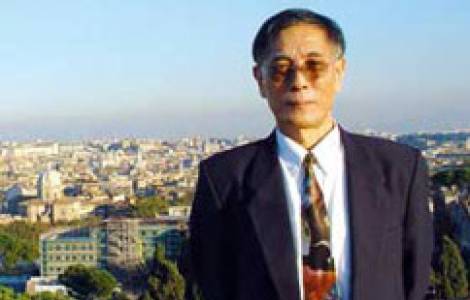
Beijing (Agenzia Fides) - "Chinese Catholics are Catholics like everyone else. They have the same faith, they read the same Bible, they go freely to church for Mass, to pray and receive the sacraments. Like the others Catholics, they love their homeland and want to participate in the life and modernization of China".
These were the words of Professor Ren Yanli, an esteemed and passionate scholar of the history of Catholicism in the People's Republic of China and China-Holy See relations, in an interview published in 2009 by 30Giorni magazine. Ren Yanli left earth on Friday, June 30, at the age of 79. He died at Chaoyang Hospital in Beijing, where he had been admitted after contracting Covid, in a state of health already compromised by several illnesses. With him disappears one of the Chinese scholars most committed for a long time to the field of research on the Catholic Church and Catholicism in contemporary times, with particular reference to the Chinese context.
Born in Yanan (Shaanxi province) in March 1944, Ren Yanli belonged anagraphically to the so-called "red princes" generation, the children of the first generation of communist leaders of the People's Republic of China. A member of the Chinese Academy of Social Sciences and the Institute for Research on World Religions, he had also headed the Academy's Office of Christianity Research, deepening studies on the Second Vatican Council. His publications are essential references for young Chinese researchers engaged in research on the recent history of Catholicism and the Catholic Church in China. The funeral, scheduled for Tuesday, July 4, will take place according to the protocols of honor reserved for members of the Academy of Social Sciences.
In recent decades, Professor Ren Yanli, together with his academic wife Wang Meixiu, also engaged in the field of research on Christianity in modern and contemporary times, have been stimulating and appreciated interlocutors of Catholic scholars and representatives of the Holy See who followed more closely the affairs of the Catholic Church in the People's Republic of China. The professor was able (and helped others) to place individual facts in the correct historical perspective, without suppressing or censoring the substantial changes in the relationship between the Catholic Church and the People's Republic of China in recent decades.
Reni Yianli, retracing in the aforementioned interview the different stages through which the Catholic Church passed in communist China, recalled that at the beginning of the People's Republic of China, "the Vatican was considered a political enemy of the new China". That is why, at the end of the 1950s, at the height of the anti-imperialist movement which then dominated Chinese politics, attempts were made to sever the relations of Chinese Catholics with the Holy See and to push the Chinese Church on the political path of independence and the autonomous appointment of bishops. But even at that time, and even more so with the reopening of China promoted by Deng Xiaoping after the cultural revolution", remarks the professor, "the dominant thought of Chinese Catholics was to restore, at the time and in the way in which they could do so, the relationship with the Holy See, the Pope and the universal Catholic Church". This is why, already underlined by Ren Yanli at the time, with fruitful and prophetic insight, it must be recognized that in the tormented events that Chinese Catholicism has experienced in recent decades, "the decisive factor has been the faith itself of Chinese Catholics, lay and the clergy. The faith of the people, the professor insisted, has helped everyone to recognize that the bond of hierarchical communion with the Pope cannot be canceled if one wants to be preserved in the Catholic faith. And this, over time", added the professor, "has also helped the government to redirect its line". Because "if the government wants bishops to be pastors esteemed and followed by the faithful, and not considered as isolated officials imposed from outside", it must recognize that Catholics, and bishops in particular, cannot renounce to live and publicly attest to their full communion with the Successor of Peter. Professor Ren Yanli, already at the time, 9 years before the agreement between the Holy See and the Beijing government on the appointment of new Chinese bishops, also invited the Holy See to take particular account of "the Church Chinese", since "during all this time, the fidelity of Chinese Catholics to the faith of the apostles was the decisive factor, even in the evolution of relations with those who run the country politically". (GV) (Agenzia Fides, 1/7/2023)
 ASIA/VIETNAM - Vietnamese Catholic communities stand alongside women in need to combat mass abortion
ASIA/VIETNAM - Vietnamese Catholic communities stand alongside women in need to combat mass abortion